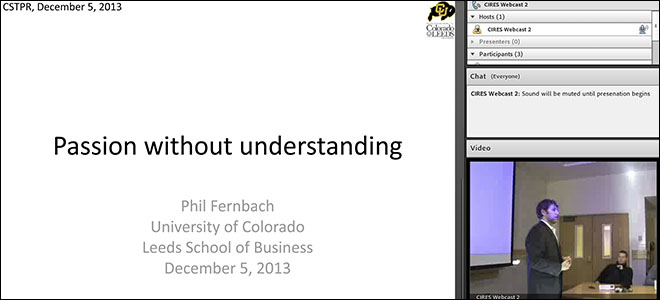Webcast Now Available for Noontime Seminar on Political Extremism
Passion Without Understanding: Political Extremism is Supported by an Illusion of Understanding
by Philip Fernbach, Leeds School of Business, University of Colorado
Abstract: People often hold extreme political attitudes about complex policies. We hypothesized that people typically know less about such policies than they think they do (the illusion of explanatory depth) and that polarized attitudes are enabled by simplistic causal models. Asking people to explain policies in detail both undermined the illusion of explanatory depth and led to attitudes that were more moderate (Experiments 1 and 2). Although these effects occurred when people were asked to generate a mechanistic explanation, they did not occur when people were instead asked to enumerate reasons for their policy preferences (Experiment 2). Finally, generating mechanistic explanations reduced donations to relevant political advocacy groups (Experiment 3). The evidence suggests that people’s mistaken sense that they understand the causal processes underlying policies contributes to political polarization.
Biography: Phil Fernbach is an assistant professor of marketing in the Leeds School of Business. He holds a Ph.D. from Brown University in cognitive science and a B.A. from Williams College where he studied philosophy. His research interests span many areas of consumer behavior including causal reasoning, probability judgment, financial decision-making, and moral judgment. His research has been published in outlets such as the Journal of Experimental Psychology: General, Psychological Science, the Journal of Consumer Research, and Cognition, and has been profiled in media outlets like ABC News, the Wall Street Journal and the Boston Globe. Prior to pursuing his Ph.D., Dr. Fernbach worked with consumer goods companies as a strategy consultant for two boutique firms in Boston.


